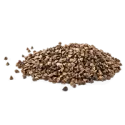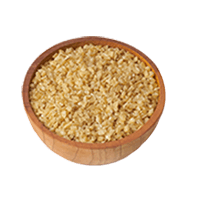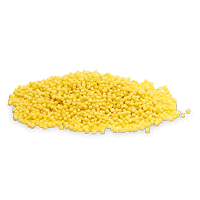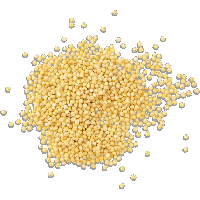Buckwheat groats, roasted, dry nutrition: calories, carbs, GI, protein, fiber, fats
*all the values are displayed for the amount of 100 grams
Top nutrition facts for Buckwheat groats, roasted, dry

| Calories ⓘ Calories for selected serving | 346 kcal |
| Net Carbs ⓘ Net Carbs = Total Carbohydrates – Fiber – Sugar Alcohols | 65 grams |
| Acidity (Based on PRAL) ⓘ PRAL (Potential renal acid load) is calculated using a formula. On the PRAL scale the higher the positive value, the more is the acidifying effect on the body. The lower the negative value, the higher the alkalinity of the food. 0 is neutral. | 4.9 (acidic) |
Carbs ⓘHigher in Carbs content than 93% of foods
Magnesium ⓘHigher in Magnesium content than 90% of foods
Net carbs ⓘHigher in Net carbs content than 89% of foods
Fiber ⓘHigher in Fiber content than 89% of foods
Phosphorus ⓘHigher in Phosphorus content than 85% of foods
Buckwheat groats, roasted, dry calories (kcal)
| Calories for different serving sizes of buckwheat groats, roasted, dry | Calories | Weight |
|---|---|---|
| Calories in 100 grams | 346 | |
| Calories in 1 cup | 567 | 164 g |
Mineral coverage chart
Mineral chart - relative view
Vitamin coverage chart
Vitamin A:
0µg of 900µg
0%
Vitamin E:
0mg of 15mg
0%
Vitamin D:
0µg of 20µg
0%
Vitamin C:
0mg of 90mg
0%
Vitamin B1:
0.67mg of 1mg
56%
Vitamin B2:
0.81mg of 1mg
63%
Vitamin B3:
15mg of 16mg
96%
Vitamin B5:
3.7mg of 5mg
74%
Vitamin B6:
1.1mg of 1mg
81%
Folate:
126µg of 400µg
32%
Vitamin B12:
0µg of 2µg
0%
Vitamin K:
0µg of 120µg
0%
Vitamin chart - relative view
Macronutrients chart
Protein:
Daily Value: 23%
11.7 g of 50 g
11.7 g (23% of DV )
Fats:
Daily Value: 4%
2.7 g of 65 g
2.7 g (4% of DV )
Carbs:
Daily Value: 25%
75 g of 300 g
75 g (25% of DV )
Water:
Daily Value: 0%
8.4 g of 2,000 g
8.4 g (0% of DV )
Other:
2.2 g
2.2 g
Protein quality breakdown
Tryptophan:
510mg of 280mg
182%
Threonine:
1344mg of 1,050mg
128%
Isoleucine:
1323mg of 1,400mg
95%
Leucine:
2208mg of 2,730mg
81%
Lysine:
1785mg of 2,100mg
85%
Methionine:
459000mg of 1,050mg
43714%
Phenylalanine:
1383mg of 1,750mg
79%
Valine:
1800mg of 1,820mg
99%
Histidine:
819mg of 700mg
117%
Fat type information
Saturated fat:
0.59 g
Monounsaturated fat:
0.83 g
Polyunsaturated fat:
0.83 g
Fiber content ratio for Buckwheat groats, roasted, dry
Sugar:
0 g
Fiber:
10 g
Other:
65 g
All nutrients for Buckwheat groats, roasted, dry per 100g
| Nutrient | Value | DV% | In TOP % of foods | Comparison |
| Vitamin A | 0µg | 0% | 100% | |
| Calories | 346kcal | 17% | 24% |
7.4 times more than Orange
|
| Protein | 12g | 28% | 40% |
4.2 times more than Broccoli
|
| Fats | 2.7g | 4% | 63% |
12.3 times less than Cheese
|
| Vitamin C | 0mg | 0% | 100% |
N/A
|
| Net carbs | 65g | N/A | 11% |
1.2 times more than Chocolate
|
| Carbs | 75g | 25% | 7% |
2.7 times more than Rice
|
| Cholesterol | 0mg | 0% | 100% |
N/A
|
| Vitamin D | 0µg | 0% | 100% |
N/A
|
| Magnesium | 221mg | 53% | 10% |
1.6 times more than Almonds
|
| Calcium | 17mg | 2% | 59% |
7.4 times less than Milk
|
| Potassium | 320mg | 9% | 32% |
2.2 times more than Cucumber
|
| Iron | 2.5mg | 31% | 29% |
1.1 times less than Beef broiled
|
| Fiber | 10g | 41% | 11% |
4.3 times more than Orange
|
| Copper | 0.62mg | 69% | 19% |
4.4 times more than Shiitake
|
| Zinc | 2.4mg | 22% | 35% |
2.6 times less than Beef broiled
|
| Phosphorus | 319mg | 46% | 15% |
1.8 times more than Chicken meat
|
| Sodium | 11mg | 0% | 85% |
44.5 times less than White bread
|
| Manganese | 1.6mg | 70% | 29% | |
| Selenium | 8.4µg | 15% | 62% | |
| Vitamin B1 | 0.22mg | 19% | 32% |
1.2 times less than Pea raw
|
| Vitamin B2 | 0.27mg | 21% | 30% |
2.1 times more than Avocado
|
| Vitamin B3 | 5.1mg | 32% | 32% |
1.9 times less than Turkey meat
|
| Vitamin B5 | 1.2mg | 25% | 31% |
1.1 times more than Sunflower seeds
|
| Vitamin B6 | 0.35mg | 27% | 35% |
3 times more than Oats
|
| Vitamin B12 | 0µg | 0% | 100% |
N/A
|
| Folate | 42µg | 11% | 37% |
1.5 times less than Brussels sprouts
|
| Choline | 54mg | 10% | 64% | |
| Saturated fat | 0.59g | 3% | 68% |
10 times less than Beef broiled
|
| Monounsaturated fat | 0.83g | N/A | 67% |
11.8 times less than Avocado
|
| Polyunsaturated fat | 0.83g | N/A | 50% |
57 times less than Walnut
|
| Tryptophan | 0.17mg | 0% | 69% |
1.8 times less than Chicken meat
|
| Threonine | 0.45mg | 0% | 74% |
1.6 times less than Beef broiled
|
| Isoleucine | 0.44mg | 0% | 75% |
2.1 times less than Salmon raw
|
| Leucine | 0.74mg | 0% | 77% |
3.3 times less than Tuna Bluefin
|
| Lysine | 0.6mg | 0% | 75% |
1.3 times more than Tofu
|
| Methionine | 153mg | 15% | 78% |
1593.8 times more than Quinoa
|
| Phenylalanine | 0.46mg | 0% | 77% |
1.4 times less than Egg
|
| Valine | 0.6mg | 0% | 74% |
3.4 times less than Soybean raw
|
| Histidine | 0.27mg | 0% | 75% |
2.7 times less than Turkey meat
|
| Omega-3 - EPA | 0g | N/A | 100% |
N/A
|
| Omega-3 - DHA | 0g | N/A | 100% |
N/A
|
| Omega-3 - DPA | 0g | N/A | 100% |
N/A
|
Check out similar food or compare with current
NUTRITION FACTS LABEL
Nutrition Facts
___servings per container
Serving Size ______________
Serving Size ______________
Amount Per 100g
Calories 346
% Daily Value*
4.2%
Total Fat
2.7g
2.7%
Saturated Fat 0.59g
0
Trans Fat
0g
0
Cholesterol 0mg
0.48%
Sodium 11mg
25%
Total Carbohydrate
75g
41%
Dietary Fiber
10g
Total Sugars 0g
Includes ? g Added Sugars
Protein
12g
Vitamin D
0mcg
0
Calcium
17mg
1.7%
Iron
2.5mg
31%
Potassium
320mg
9.4%
*
The % Daily Value (DV) tells you how much a nutrient in a serving of food contributes to a daily diet. 2,000 calories a day is used for general nutrition advice.
Health checks
ⓘ
Dietary cholesterol is not associated with an increased risk of coronary heart disease in healthy individuals. However, dietary cholesterol is common in foods that are high in harmful saturated fats.
Source
Low in Cholesterol
ⓘ
Trans fat consumption increases the risk of cardiovascular disease and mortality by negatively affecting blood lipid levels.
Source
No Trans Fats
ⓘ
Saturated fat intake can raise total cholesterol and LDL (low-density lipoprotein) levels, leading to an increased risk of atherosclerosis. Dietary guidelines recommend limiting saturated fats to under 10% of calories a day.
Source
Low in Saturated Fats
ⓘ
While the consumption of moderate amounts of added sugars is not detrimental to health, an excessive intake can increase the risk of obesity, and therefore, diabetes.
Source
Low in Sugars
References
All the values for which the sources are not specified explicitly are taken from FDA’s Food Central. The exact link to the food presented on this page can be found below.


